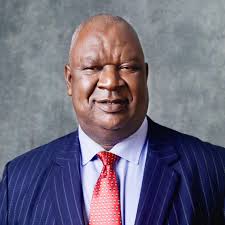In a significant political move, former Senate President and Secretary to the Government of the Federation, Chief Pius Anyim Pius, has officially joined the All Progressives Congress (APC), leaving behind his long-standing affiliation with the People’s Democratic Party (PDP). The announcement came during a mega rally held at the Pa Ngele Oruta Township Stadium in Abakaliki, Ebonyi State.

Anyim’s defection was not a solitary event. He was joined by Architect Edward Nwkegu, a prominent figure in the Ebonyi State Labour Party, along with their respective supporters. This mass transition marks a notable shift in the state’s political dynamics, potentially strengthening the APC’s position in the region.
During the rally, Senator Anyim addressed the crowd, emphasizing the significance of the day for Ebonyi State governance. “Today is remarkable in the government of Ebonyi State. Today, we are back together,” he stated, hinting at a reunification of political forces within the state.
Anyim also took the opportunity to rally support for President Bola Ahmed Tinubu’s Renewed Hope Agenda and Governor Francis Ogbonna Nwifuru’s administration. He called on all Ebonyi residents to stand behind the President as the nation navigates through challenging times. “We call on all Ebonyi people to support Mr. President as he navigates the nation through these trying times,” Anyim urged.
The former Senate President’s move to the APC could have far-reaching implications for both state and national politics. As a respected political figure with extensive experience in governance, Anyim’s decision may influence other politicians and voters in the South-East region.
This defection comes at a time when Nigeria faces numerous challenges, including economic difficulties and security concerns. Anyim’s appeal for national unity behind President Tinubu’s leadership suggests a desire to contribute to addressing these issues from within the ruling party.
The event also highlighted the fluid nature of Nigerian politics, where party allegiances can shift based on changing political landscapes and personal convictions. This flexibility allows for realignments that can significantly alter the balance of power in various regions.
While the long-term impact of these defections remains to be seen, they undoubtedly represent a boost for the APC in Ebonyi State. The influx of experienced politicians and their supporters could provide the party with additional resources and expertise as it seeks to consolidate its position in the state and the broader South-East region.
As Nigeria continues to grapple with various national challenges, political movements like these will likely play a crucial role in shaping the country’s future. The coming months may reveal whether this shift in Ebonyi’s political landscape will translate into tangible benefits for the state’s residents and contribute to the broader national development agenda.
For now, all eyes will be on how Anyim and other defectors integrate into the APC structure and what roles they might play in both state and national politics moving forward.



